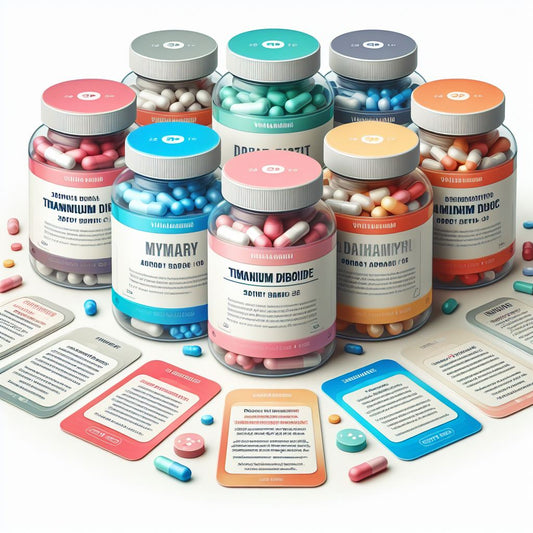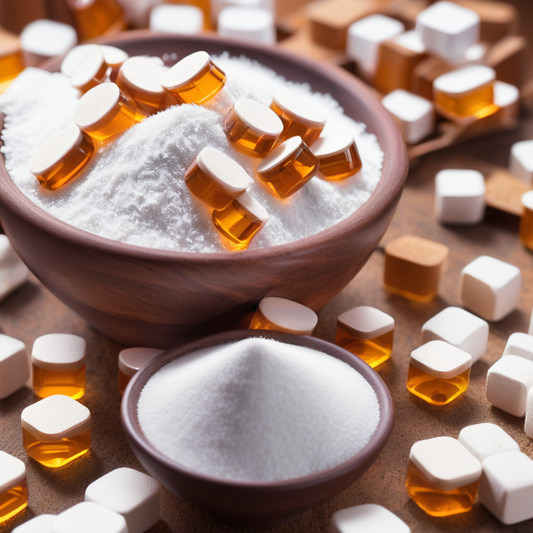Have you ever flipped over a supplement bottle and seen the words "sugar-free" or "low-carb," only to find ingredients like sorbitol, xylitol, or maltitol listed? These sneaky additives, known as polyols, might seem like a healthy alternative, but the European Union (EU) has sounded the alarm. In a groundbreaking decision, the EU has considered a reduction in the use of polyols in supplements, leaving many consumers wondering, "What's the big deal?"
There are some significant concerns to be discussed while talking about supplements, especially the ones containing these polyols. To understand these, let us get to understand a bit about them. This blog discusses the compelling scientific evidence that has led to their flagging. It will provide you with a clear understanding of the health implications of polyols and the sweeter alternatives (for your health).
I. What are Polyols?
Polyols Unveiled: The Sweet Deception
Polyols are commonly known as Sugar alcohols. These carbohydrates are found naturally in some fruits and vegetables. However, they are primarily used on a large scale in sugar-free candies, gums, baked goods, and similar products. Manufacturers and brands often advertise them as a low-calorie alternatives to sugar. This creates a sense of appeal to health-conscious consumers and those consumers with diabetes or insulin resistance.
Common types of polyols found in supplements include:
- Sorbitol: One of the most widely used polyols, often derived from corn syrup.
- Xylitol: Found naturally in small amounts in fruits and vegetables, xylitol is also produced commercially from plant materials.
- Maltitol: Often used as a sugar substitute in chocolate and other confectionery products.
- Mannitol: Derived from seaweed or tree bark, it is sometimes used in medications and supplements.
II. What was the landmark decision for consumer health?
The EU's consideration of polyols in supplements is not a hasty decision. It's a carefully considered regulatory action based on a growing body of scientific evidence that raises concerns about the safety of these sweeteners. Numerous studies have linked polyol consumption to a range of health problems, prompting regulators to prioritize consumer well-being and restrict their use in supplements.
Key reasons behind the EU scrutiny include:
- Gastrointestinal Distress: Polyols have a poor absorption rate in the human body. Their presence in the diet can lead to digestive issues and other gut-related issues. Some of the prevalent issues seen after prolonged consumption of polyols include abdominal pain, cramping, and diarrhoea. Studies have shown that even minute quantities have been a cause of digestive distress.
- Blood Sugar Impact: While polyols have a lower glycemic index than sugar and don't spike blood sugar levels as quickly, they are not entirely without impact. Studies show that polyols can still affect blood sugar levels, albeit to a lesser extent than regular sugar. This can be particularly problematic for individuals with diabetes who need to manage their blood sugar carefully.
- Potential for Overconsumption: Polyols are often found in a wide range of products, making it easy to unknowingly consume them in excess. This increases the risk of experiencing adverse side effects associated with these sweeteners.
- Lack of Long-Term Safety Data: While some studies have explored the short-term effects of polyols, limited research exists on their long-term health consequences. This lack of data raises concerns about the potential for chronic health problems with prolonged polyol consumption.
III. What are other alternatives to sweeteners?
With polyols being a vulnerable option in EU supplements, manufacturers and consumers seek safer alternatives. Fortunately, there are several options available that offer sweetness without the same health risks:
- Stevia: Derived from the leaves of the Stevia rebaudiana plant, stevia is a natural sweetener with zero calories and no impact on blood sugar levels.
- Monk Fruit Extract: Another natural sweetener, monk fruit extract, is derived from the monk fruit, a small round fruit native to Southeast Asia. It's intensely sweet but contains no calories or carbohydrates.
- Erythritol (in moderation): Erythritol is another sugar alcohol, but it differs from other polyols as it is mostly absorbed by the body before reaching the large intestine, thereby reducing the risk of digestive problems. However, excessive erythritol consumption may still lead to some digestive discomfort in sensitive individuals.
Here comes our transdermal patches to your rescue. These transdermal patches are responsible for prolonged and continuous supplement delivery. They also have better bioavailability (which means that the absorption of nutrients is much higher than that of any oral supplement). At Patch Up, we believe consumers deserve the best, and our transdermal patches reflect this commitment.
III. How to make informed choices?
Consideration of polyols in supplements is a significant step towards safeguarding consumer health. It highlights the importance of scrutinising supplement labels and understanding the potential risks and benefits of each ingredient. By staying informed and choosing supplements that prioritise safety and efficacy, you can confidently support your well-being.
As we move forward, it's crucial to remember that our knowledge of food ingredients and their impact on our bodies is constantly evolving. By staying curious, asking questions, and seeking out reputable information, we can make empowered decisions about the supplements we choose and prioritise our long-term health.
References
- Lenhart, A., & Chey, W. D. (2017). A Systematic Review of the Effects of Polyols on Gastrointestinal Health and Irritable Bowel Syndrome. Advances in nutrition (Bethesda, Md.), 8(4), 587–596. https://doi.org/10.3945/an.117.015560
- Piekara, A., Krzywonos, M., & Szymańska, A. (2020). Sweetening Agents and Sweeteners in Dietary Supplements for Children-Analysis of the Polish Market. Nutrients, 12(8), 2387. https://doi.org/10.3390/nu12082387
- Human verification. (n.d.). https://www.semanticscholar.org/paper/Health-potential-of-polyols-as-sugar-replacers,-on-Livesey/64278f724711012d9a8ae2ccd0af58cbdfa4e395
- Msomi, N. Z., Erukainure, O. L., & Islam, M. S. (2021). Suitability of sugar Alcohols as antidiabetic Supplements: a review. Yàowù Shípǐn Fēnxī, 29(1), 1–14. https://doi.org/10.38212/2224-6614.3107
- Sharma, A., Amarnath, S., Thulasimani, M., & Ramaswamy, S. (2016). Artificial sweeteners as a sugar substitute: Are they really safe?. Indian journal of pharmacology, 48(3), 237–240. https://doi.org/10.4103/0253-7613.182888
- Tandel K. R. (2011). Sugar substitutes: Health controversy over perceived benefits. Journal of pharmacology & pharmacotherapeutics, 2(4), 236–243. https://doi.org/10.4103/0976-500X.85936
- https://www.hopkinsmedicine.org/health/wellness-and-prevention/facts-about-sugar-and-sugar-substitutes





